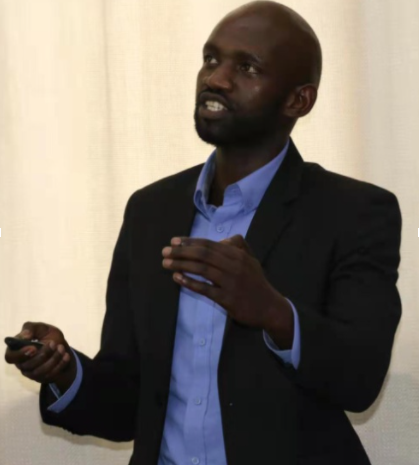 Since 2013, over 50 foreign students from developing countries worldwide have received the support of the Chinese Academy of Sciences (CAS) and The World Academy of Sciences (TWAS) for the advancement of science in developing countries, known as CAS-TWAS scholarship, through CAS-TWAS Center of Excellence for Biotechnology. Those students go to CAS for their PhD training and have the opportunity to do research in the top laboratories of China.
Since 2013, over 50 foreign students from developing countries worldwide have received the support of the Chinese Academy of Sciences (CAS) and The World Academy of Sciences (TWAS) for the advancement of science in developing countries, known as CAS-TWAS scholarship, through CAS-TWAS Center of Excellence for Biotechnology. Those students go to CAS for their PhD training and have the opportunity to do research in the top laboratories of China.
Jean Paul Sinumvayo of Rwanda is one of the selected fellows, who was enrolled in 2017 as a PhD student in Professor Yin Li’s lab, at CAS Institute of Microbiology. Sinumvayo's research project was carried out at the State Key Laboratory of Microbial Physiology and Biotechnology, where he mainly focused on Microbial “One-Pot” of Biofuels Production.
During the four-year study in Prof. Li’s lab, Sinumvayo published five articles in peer-reviewed journals with an average of at least one article each year. His research focused in particular on the development of engineered E. coli strain for butanol production from cellulosic materials. The idea was originally proposed by a PhD colleague of Prof. Li’s lab and was aimed at developing an E. coli consortium, where one E. coli strain uses C-6 sugars as a substrate and another strain uses C-5 sugars. This so-called “Y-shaped” consortium is expected to efficiently utilize C-6 and C-5 sugars for butanol production. As part of the team involved in this project, Sinumvayo contributed greatly to the fermentation process and the strain engineering. An outstanding result was that such a Y-shaped E. coli consortium could efficiently utilize both glucose and xylose for high-titer and high-yield production of butanol. This research was published in Metabolic Engineering and Sinumvayo appeared as a co-author.
Inspired by the success of this Y-shaped consortium, Sinumvayo started to explore another idea that was to develop another E. coli consortium to produce butyl butyrate (BB), an important solvent. Engineered E. coli was reported to produce BB, but the titer was extremely low (at mg/L level). Implementation of this idea was to engineer the butanol-producing E. coli and butyrate-producing strain and let the butanol-and butyrate-producing E. coli strains work together to produce BB, with the assistance of lipase. To this end, Sinumvayo successfully constructed a consortium of the two strains and achieved, after some optimizations, the highest BB production by E. coli. This research was published in Bioresources and Bioprocessing and was selected by the Editor-in-Chief as the only monthly highlight in March 2021. To precisely define the consortium he constructed, Sinumvayo proposed the name “cognate consortium”.
Followed by the success of constructing a “diamond-shaped” cognate consortium for BB production from glucose, Sinumvayo also did some preliminary work on developing a cognate consortium for BB production from xylose and glucose, thus combining the concept of “diamond-shaped” and “Y-shaped” consortiums. Soon Sinumvayo was able to show that the integration of two could produce a higher titer of BB from xylose and glucose, making a further step ahead on microbial BB production. With all these key findings behind him, he wrote a review article entitled “Microbial production of butyl butyrate: from a single strain to cognate consortium”, published in June 2021 in Bioresources and Bioprocessing.
Sinumvayo received numerous awards from CAS, including Best Proposal Award implemented by CAS-TWAS Centre of Excellence for Biotechnology (2018); Second Prize Scholarship of the Key Laboratory of Microbial Physiology and Metabolic Engineering, Institute of Microbiology, CAS (2020 and 2021).
Last July, after careful rigorous review by the relevant scholarship committee, Sinumvayo was selected and was awarded the 2021 Outstanding International Graduate of University of Chinese Academy of Sciences.
Sinumvayo graduated in July 2021 from CAS Institute of Microbiology. He is planning to continue his research project with biofuel and green energy in East Africa. Since plenty of straw is available in East Africa, further research can be conducted to convert straw into glucose, which is sugar that can be fermented (broken down) to biofuels by microbes. Sinumvayo's dream is to be able to make microbes the key to power cars.
Sinumvayo's knowledge and the skills he acquired abroad could also be applied in other sectors such as food industry, biopharmaceutical industry as well as agriculture, thus supporting his native Rwanda to make considerable strides towards an economy based on science and technology.
Introduction of CAS-TWAS Centre of Excellence for Biotechnology (CoEBio)
CAS-TWAS Centre of Excellence for Biotechnology (CoEBio) was founded in 2013 and is affiliated with CAS Institute of Microbiology. CoEBio aims at improving and supporting biotechnology education with the purpose of providing biotechnological solutions to address a wide range of challenges faced by developing countries, particularly those related to energy, population, health and environment.
The main mission of CoEBio includes:
- Assisting developing countries in advancing the education of students and scholars in the area of biotechnology;
- Organizing biotechnology training courses, conferences, symposiums and workshops in developing countries;
- Coordinating biotechnology-related research and development projects for developing countries; and
- Supporting strategic intelligence analysis for biotechnology development in developing countries.

